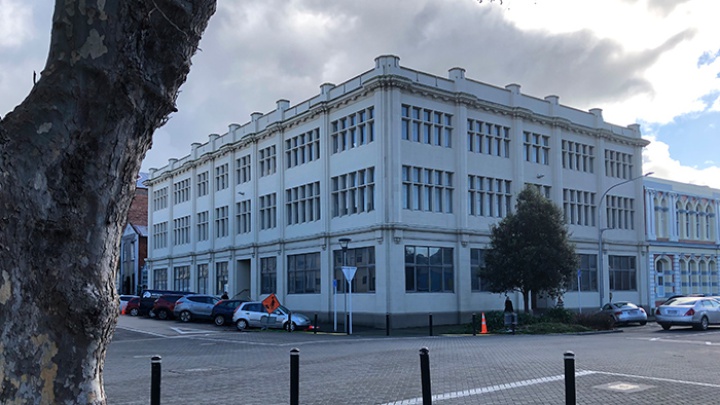The Backhouse Home To New Innovation Collaboration
A new centre for innovation, creative industries, entrepreneurship and education - housed in the historic Backhouse building on UCOL Whanganui’s campus - is inspiring excitement in the city’s creative hub.

The Backhouse
UCOL Board Chair Verne Atmore said the collaboration between economic development agency Whanganui & Partners and UCOL reflected the future for a city of design and creativity.
“We have a shared aspiration to create business friendly spaces that bring together entrepreneurship and education. This will be an amazing place for stronger relationships between businesses and UCOL staff and students. There has been a lot of work behind the scenes to bring this new innovation collaboration to fruition.”
The Backhouse is a stunning historic building with views of the Whanganui River and the arts precinct. “There has been overwhelming support and excitement from stakeholders and interest groups for the idea, and this has the potential to transform how we approach innovation, education and business,” Atmore said.
Tim Easton, Whanganui & Partners Strategic Lead – Business, said The Backhouse was the ideal place to explore new business opportunities, deliver business growth projects and innovative ideas.
“Whanganui & Partners approached UCOL with the concept of how The Backhouse might be utilised as a home for innovation and start-ups in Whanganui,” Easton said.
“The support and dialogue from UCOL has been fantastic. The Backhouse project perfectly aligns with Whanganui & Partners’ aims to help develop new businesses, improve Whanganui’s labour capability and support our creative industries.”
The Backhouse already has a number of tenants on board, Easton said, including 100% SWEET, the Port Employment Precinct, Te Manu Atatū, Chamber of Commerce and Confluence. Interest in The Backhouse has affirmed the need for this type of collaborative place, he said, and the list of motivated potential tenants meant the building’s spaces were filling fast.
The concept of The Backhouse is modelled on similar successful operations such as The IceHouse in Auckland, The Factory in Palmerston North, and CreativeHQ in Wellington. The specific operating model, services provided and the connections utilised are unique in each location, and the vision is to remain closely connected to the community.
To keep this connection strong, The Backhouse will be run by a group of trustees committed to seeing the Whanganui region thrive. The Backhouse Trust has been recently established and currently consists of two appointed trustees, Gaelle Deighton and Mark Cleaver. Deighton has been appointed by Whanganui & Partners and Cleaver represents UCOL.
Vacancies for five more positions on the Trust will be advertised in the coming months. The Trust will be looking for trustees from diverse backgrounds who can help The Backhouse reach its potential as an innovative centre for new ideas and business development.
The Backhouse Trust will be responsible for fulfilling the tenancy requirements of the building, which will be relative to prospective organisations’ ability to fit with the strategic vision of The Backhouse.
“The facility is a shared working space for Whanganui creatives, innovators, education providers and organisations developing Whanganui’s labour capability,” Easton said.
Whanganui & Partners considered The Backhouse’s location, alongside the Drews Ave redevelopments, next to UCOL and close to Whanganui River and CBD, to be an ideal location for creative thinking and business development.
Built in 1926, The Backhouse building provides a sense of the progress and possibility of the 1920s. The Backhouse Trust’s vision is to revive that in the 2020s.
Note:
UCOL Ltd is part of Te Pūkenga, New Zealand’s largest tertiary education provider, and globally, the 35th largest provider of vocational education. Together, we aim to provide excellent quality education opportunities that support learners, employers and communities to gain the skills, knowledge and capabilities Aotearoa needs now and for the future.
Across the country, approximately 240,000 people are participating in some form of vocational education and training, supported by about 10,000 full time staff.


 NZ Amateur Sport Association: 22 Amendments Proposed For 2022 Act Lodged On 22 November
NZ Amateur Sport Association: 22 Amendments Proposed For 2022 Act Lodged On 22 November Auckland University of Technology: Reading Helps Children Face A Difficult Future
Auckland University of Technology: Reading Helps Children Face A Difficult Future PATHA: Puberty Blocker Evidence Brief Affirms Aotearoa’s Approach
PATHA: Puberty Blocker Evidence Brief Affirms Aotearoa’s Approach Tataki Auckland Unlimited: Into Ocean & Ice - Unveiling Antarctica's Past And Present
Tataki Auckland Unlimited: Into Ocean & Ice - Unveiling Antarctica's Past And Present Health Coalition Aotearoa: Urgent Action Needed To Address Aotearoa’s Shameful Household Food Insecurity
Health Coalition Aotearoa: Urgent Action Needed To Address Aotearoa’s Shameful Household Food Insecurity GPNZ: 2023/24 New Zealand Health Survey - One Quarter Of Kiwi Adults Unable To Access General Practice
GPNZ: 2023/24 New Zealand Health Survey - One Quarter Of Kiwi Adults Unable To Access General Practice